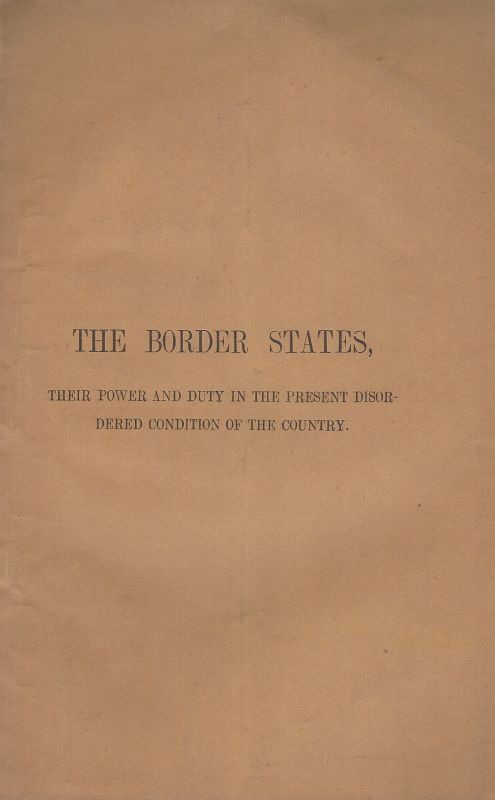[Kennedy, The Border States, their power and duty in the present disordered cond
The Border States, their power and duty in the present disordered condition of the Country.
(Maryland), (1860). 8°. 46 pages. Softcover. This is an Original Pamphlet. Original brochure. Not the Lippincott-publication, this must be a proof or a preprint of the publication. It contains several handwritten notes and markings in pencil by an old hand.
“The country is now, or, from all the tidings that reach us, must soon be compelled to accept the fact that South Carolina has seceded from the Union. Whatever my be the right of secession, it is about to become a practical fact. South Carolina has announced her purpose, as far as it is in her power, to dissolve the Union. Other states belonging to that series which has lately assumed the designation of the Cotton States….are likely to follow her example……”″
John Pendleton Kennedy (October 25, 1795 – August 18, 1870) was an American novelist and Whig politician who served as United States Secretary of the Navy from July 26, 1852 to March 4, 1853, during the administration of President Millard Fillmore, and as a U.S. Representative from the Maryland’s 4th congressional district. He was the brother of U.S. Senator Anthony Kennedy.
Born in Baltimore, Maryland, on October 25, 1795,the son of merchant John Kennedy and Nancy Pendleton. Poor investments resulted in his father declaring bankruptcy in 1809. He graduated from Baltimore College in 1812 and fought in the Battles of Bladensburg and North Point in the War of 1812. Although admitted to the bar in 1816, he was much more interested in literature and politics than law.
Kennedy’s first literary attempt was a fortnightly periodical called the Red Book, publishing anonymously with his roommate Peter Hoffman Cruse from 1819–1820. Kennedy published Swallow Barn, or A Sojourn in the Old Dominion in 1832, which would become his best-known work. Horse-Shoe Robinson was published in 1835 to win a permanent place of respect in the history of American fiction. Also in 1835, he helped introduce Edgar Allan Poe to Thomas Willis White, editor of the Southern Literary Messenger.
While abroad Kennedy became a friend of William Makepeace Thackeray and wrote or outlined the fourth chapter of the second volume of The Virginians, a fact which accounts for the great accuracy of its scenic descriptions. Of his works Horse-Shoe Robinson is the best and ranks high in antebellum fiction. He sometimes used the pen name Mark Littleton, especially in his political satires.
Kennedy was an active Whig. He was appointed Secretary of the Legation in Chile on January 27, 1823, but did not proceed to his post and resigned on June 23 of the same year. He was elected to the Maryland House of Delegates in 1820 and in 1838, he succeeded Isaac McKim in the U.S. House of Representatives, but was defeated in his bid for reelection in November of that year. He was re-elected to Congress in 1840 and 1842; but, because of his strong opposition to the annexation of Texas, he was defeated in 1844. His influence in Congress was largely responsible for the appropriation of $30,000 to test Samuel Morse’s telegraph.
President Millard Fillmore appointed Kennedy to the post of Secretary of the Navy in July 1852. During Kennedy’s tenure in office, the Navy organized four important naval expeditions including that which sent Commodore Matthew C. Perry to Japan and Lieutenant William Lewis Herndon and Lieutenant Lardner Gibbon to explore the Amazon .
Kennedy retired from public life in March 1853 when President Fillmore left office, but he retained an active interest in politics and forcefully supported the Union. At the end of the American Civil War he advocated amnesty for the South. He died at Newport, Rhode Island on August 18, 1870, and is buried in Greenmount Cemetery in Baltimore, Maryland. The USS John P. Kennedy and USS Kennedy (DD-306) were named for him. (Wikipedia)
- Keywords: 19.Jahrhundert · 19th Century · 19th Century – Rare · American Civil War · American Civil War Pamphlets · American History · American History – Rare · Expeditions – Rare · JFK · John F. Kennedy · Pamphlets
- Language: English
- Inventory Number: 23031AB
EUR 220,--
© 2026 Inanna Rare Books Ltd. | Powered by HESCOM-Software










